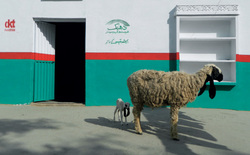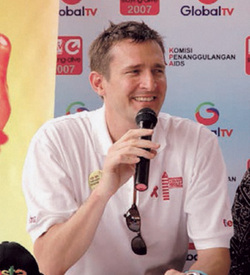 A ewe and her offspring outside a DKT facility in Pakistan were merely wandering by the family-planning clinic. Social-sector franchising takes advantage of franchising’s systems and on-going support to do good in the world. Franchisees in developing countries make a living helping their communities. By Nancy Weingartner for Franchise Times A couple’s method of birth control, along with the number of family members and their names are posted on the front doors of homes in Bali. In Mozambique, posting family planning specials, such as injections, on Facebook is DKT’s Intimo clinic’s most efficient marketing tool. Its Facebook page has more than 6,600 “friends.” Young men in Brazil are encouraged to use their GPS apps to share their condom experiences and location as part of a contest run by a local clinic. “The U.S. is much more prudish about this subject” than the rest of the world, claims Chris Purdy, president and CEO of DKT International, a social-sector franchise that provides family planning and reproductive health products to the developing world. We’re prudish, he continues, because there’s no denying family planning was created so people can have sex without having children. It may seem all about pleasure, but for women, controlling their fertility is a way to control their destiny, Purdy says. Fewer children mean more food on the table, more rest for the mother, more education options for her children. And in areas with limited prenatal care, fewer pregnancies may result in healthier moms and offspring. DKT, based in Washington, D.C., was started by libertarian Phil Harvey 20 years ago as a nonprofit to promote family planning and HIV/AIDS prevention through social marketing. Harvey began his career selling condoms through the mail, a relatively controversial practice in the ‘70s. The business evolved into Adam & Eve, a mail-order company for sex products, and some of the profits are used to fund DKT. Harvey retired from DKT at the end of 2013. Today DKT has programs in 19 countries, which use both social media to market and a franchise framework to provide a variety of family planning services. The nonprofit was named in honor of D.K. Tyagi, India’s assistant commissioner of family planning who died of cancer in 1969, but not before he made significant inroads into India’s family planning efforts. DKT uses all the techniques and infrastructure of commercial franchising, but doesn’t charge an upfront fee or royalties. Instead, the nonprofit makes its operating money through the products its sells clinics. Midwives are the targeted franchisees, and donor money is used to update or build clean, branded clinics where windows aren’t broken and equipment generally works. In keeping with the franchise model, DKT provides continual training and education, as well as audits to ensure the clinics follow procedures. For instance, in Indonesia, “mystery shoppers”—or in this case, mystery customers—are employed to ensure the clinical experience is up to code, Purdy says. Incentives for midwives to become franchisees include a clean, modern facility; ongoing education and products; and cachet in the community since the clinics are advertised on television and billboards. The good news for family planning advocates in developing companies is that individual incomes have risen over the years, while the cost of contraceptives has stabilized, Purdy says. DKT offers franchisees a wide range of products, a number of which require some medical expertise to administer, such as IUDs and implants. Condoms aren’t a big part of the business because they can be purchased over the counter elsewhere. But the main draw is DKT’s ability to drive business to the clinics through large-scale advertising, something an individual clinic owner would not be able to do, Purdy adds. It’s effective because even families in the remote areas of countries like Pakistan have television reception. Controversy sells Not surprisingly, the social-sector franchise that provides not only preventive measures, but also abortions, can be controversial in some areas of the world. Which is why DKT works with local governments. When Ethiopia recently legalized medical abortions, DKT was part of that change, Purdy says. Between 70 and 80 percent of its $160 million budget comes from sales revenues of products to clinics, Purdy says. While conforming to the franchise’s standards, each clinic has its own personality and the services are determined by demand. In Indonesia, for instance, injectable contraceptives are the most popular method of family planning because people there believe medicine must be injected into the blood in order to be real, Purdy says. This is a positive for the franchisee, because it means women must come back every three months for another shot, as opposed to an IUD insertion, which doesn’t require frequent return visits. Because choosing an IUD cuts down the providers’ profits, “We have to watch provider bias,” Purdy says. Most of the visits are from women, since they’re the ones directly affected by the issue; however, Purdy says the occasional man will show up for an appointment with his wife, especially if she’s considering an IUD. Since it’s a foreign object inserted into a woman’s uterus, the man “might be worried it will affect him,” Purdy says. Marketing condoms can be a touchy subject for government censors, as well. “When you talk about condoms, (men) don’t want to hear about HIV, they want to hear about the benefits,” Purdy explains. “So we talk about pleasure.” In Pakistan a suggestive ad for Josh Condoms, starring a controversial actress, who talks openly about sex on a late-night television show, was banned by the government. Which, of course, led to the ad, which depicted an average-looking guy marrying a supermodel because he used Josh Condoms, to be a downloadable success on YouTube. DKT was proud it hit a nerve. “It sparked a huge debate about why can’t we talk about condom use,” Purdy says. “We’re happy with the results even though the ad pulled.” (In 2013, DKT sold 538 million condoms worldwide.) Combining social-sector franchising with social media has enabled the brand to grow throughout the developing world, attracting donors such as the Bill and Melinda Gates Foundation, the United Nations Population Fund and USAID. The brand grows, the families don’t—or if they do, it’s responsibly.  DKT’s CEO Christopher Purdy served as country director for programs in Ethiopia, Indonesia and Turkey before returning to the U.S. to work at the social-sector franchise’s headquarters. Comments are closed.
|
Blog Team
Posts on our blog are contributed by a team of professionals dedicated to developing valuable resources for the Social Sector Franchising community. Archives
May 2024
|

 RSS Feed
RSS Feed
